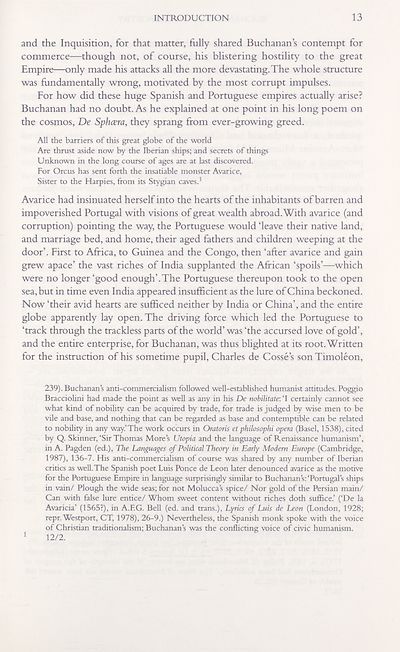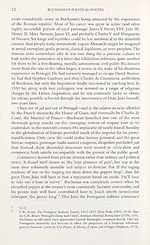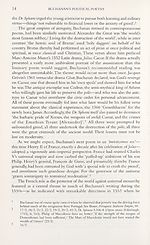Series 5 > George Buchanan
(34) Page 13
Download files
Complete book:
Individual page:
Thumbnail gallery: Grid view | List view

INTRODUCTION
13
and the Inquisition, for that matter, fully shared Buchanan s contempt for
commerce—though not, of course, his blistering hostility to the great
Empire—only made his attacks all the more devastating. The whole structure
was fundamentally wrong, motivated by the most corrupt impulses.
For how did these huge Spanish and Portuguese empires actually arise?
Buchanan had no doubt. As he explained at one point in his long poem on
the cosmos, De Sphcera, they sprang from ever-growing greed.
All the barriers of this great globe of the world
Are thrust aside now by the Iberian ships; and secrets of things
Unknown in the long course of ages are at last discovered.
For Orcus has sent forth the insatiable monster Avarice,
Sister to the Harpies, from its Stygian caves.1
Avarice had insinuated herself into the hearts of the inhabitants of barren and
impoverished Portugal with visions of great wealth abroad. With avarice (and
corruption) pointing the way, the Portuguese would ‘leave their native land,
and marriage bed, and home, their aged fathers and children weeping at the
door’. First to Africa, to Guinea and the Congo, then ‘after avarice and gain
grew apace’ the vast riches of India supplanted the African ‘spoils’—which
were no longer‘good enough’.The Portuguese thereupon took to the open
sea, but in time even India appeared insufficient as the lure of China beckoned.
Now ‘their avid hearts are sufficed neither by India or China’, and the entire
globe apparendy lay open. The driving force which led the Portuguese to
‘track through the trackless parts of the world’ was ‘the accursed love of gold’,
and the entire enterprise, for Buchanan, was thus blighted at its root. Written
for the instruction of his sometime pupil, Charles de Cosse’s sonTimoleon,
239). Buchanan’s anti-commercialism followed well-established humanist attitudes. Poggio
Bracciolini had made the point as well as any in his De nobilitate: ‘I certainly cannot see
what kind of nobility can be acquired by trade, for trade is judged by wise men to be
vile and base, and nothing that can be regarded as base and contemptible can be related
to nobility in any way.’The work occurs in Oratoris et philosophi opera (Basel, 1538), cited
by Q. Skinner,‘Sir Thomas More’s Utopia and the language of Renaissance humanism’,
in A. Pagden (ed.). The Languages of Political Theory in Early Modem Europe (Cambridge,
1987), 136-7. His anti-commercialism of course was shared by any number of Iberian
critics as well. The Spanish poet Luis Ponce de Leon later denounced avarice as the motive
for the Portuguese Empire in language surprisingly similar to Buchanan’s:‘Portugal’s ships
in vain/ Plough the wide seas; for not Molucca’s spice/ Nor gold of the Persian main/
Can with false lure entice/ Whom sweet content without riches doth suffice.’ (‘De la
Avaricia’ (1565?), in A.F.G. Bell (ed. and trans.). Lyrics of Luis de Leon (London, 1928;
repr. Westport, CT, 1978), 26-9.) Nevertheless, the Spanish monk spoke with the voice
of Christian traditionalism; Buchanan’s was the conflicting voice of civic humanism.
12/2.
13
and the Inquisition, for that matter, fully shared Buchanan s contempt for
commerce—though not, of course, his blistering hostility to the great
Empire—only made his attacks all the more devastating. The whole structure
was fundamentally wrong, motivated by the most corrupt impulses.
For how did these huge Spanish and Portuguese empires actually arise?
Buchanan had no doubt. As he explained at one point in his long poem on
the cosmos, De Sphcera, they sprang from ever-growing greed.
All the barriers of this great globe of the world
Are thrust aside now by the Iberian ships; and secrets of things
Unknown in the long course of ages are at last discovered.
For Orcus has sent forth the insatiable monster Avarice,
Sister to the Harpies, from its Stygian caves.1
Avarice had insinuated herself into the hearts of the inhabitants of barren and
impoverished Portugal with visions of great wealth abroad. With avarice (and
corruption) pointing the way, the Portuguese would ‘leave their native land,
and marriage bed, and home, their aged fathers and children weeping at the
door’. First to Africa, to Guinea and the Congo, then ‘after avarice and gain
grew apace’ the vast riches of India supplanted the African ‘spoils’—which
were no longer‘good enough’.The Portuguese thereupon took to the open
sea, but in time even India appeared insufficient as the lure of China beckoned.
Now ‘their avid hearts are sufficed neither by India or China’, and the entire
globe apparendy lay open. The driving force which led the Portuguese to
‘track through the trackless parts of the world’ was ‘the accursed love of gold’,
and the entire enterprise, for Buchanan, was thus blighted at its root. Written
for the instruction of his sometime pupil, Charles de Cosse’s sonTimoleon,
239). Buchanan’s anti-commercialism followed well-established humanist attitudes. Poggio
Bracciolini had made the point as well as any in his De nobilitate: ‘I certainly cannot see
what kind of nobility can be acquired by trade, for trade is judged by wise men to be
vile and base, and nothing that can be regarded as base and contemptible can be related
to nobility in any way.’The work occurs in Oratoris et philosophi opera (Basel, 1538), cited
by Q. Skinner,‘Sir Thomas More’s Utopia and the language of Renaissance humanism’,
in A. Pagden (ed.). The Languages of Political Theory in Early Modem Europe (Cambridge,
1987), 136-7. His anti-commercialism of course was shared by any number of Iberian
critics as well. The Spanish poet Luis Ponce de Leon later denounced avarice as the motive
for the Portuguese Empire in language surprisingly similar to Buchanan’s:‘Portugal’s ships
in vain/ Plough the wide seas; for not Molucca’s spice/ Nor gold of the Persian main/
Can with false lure entice/ Whom sweet content without riches doth suffice.’ (‘De la
Avaricia’ (1565?), in A.F.G. Bell (ed. and trans.). Lyrics of Luis de Leon (London, 1928;
repr. Westport, CT, 1978), 26-9.) Nevertheless, the Spanish monk spoke with the voice
of Christian traditionalism; Buchanan’s was the conflicting voice of civic humanism.
12/2.
Set display mode to:
![]() Universal Viewer |
Universal Viewer | ![]() Mirador |
Large image | Transcription
Mirador |
Large image | Transcription
Images and transcriptions on this page, including medium image downloads, may be used under the Creative Commons Attribution 4.0 International Licence unless otherwise stated. ![]()
| Scottish History Society volumes > Series 5 > George Buchanan > (34) Page 13 |
|---|
| Permanent URL | https://digital.nls.uk/127334685 |
|---|
| Description | Over 180 volumes, published by the Scottish History Society, containing original sources on Scotland's history and people. With a wide range of subjects, the books collectively cover all periods from the 12th to 20th centuries, and reflect changing trends in Scottish history. Sources are accompanied by scholarly interpretation, references and bibliographies. Volumes are usually published annually, and more digitised volumes will be added as they become available. |
|---|


